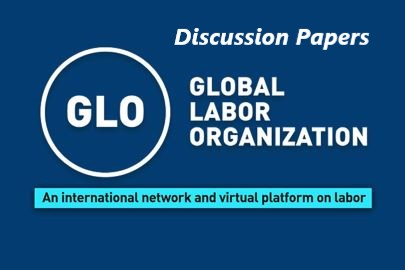A new GLO Discussion Paper finds that while the nonfatal accident rate decreased after the implementation of the regulation, the isolated effect on accidents that usually provoke hard-to-diagnose injuries (dislocations, back pain, sprains, and strains) shows a significant increase.

GLO Discussion Paper No. 1277, 2023
Workers’ behavior after safety regulations: Impact evaluation of the Spanish Occupational Safety and Health Act – Download PDF
by Delgado-Cubillo, Pablo & Martín Román, Ángel L.
GLO Fellow Ángel L. Martín-Román
Author Abstract: While the 1995 Occupational Safety and Health Act (OSH) regulation transformed the outlook on workplaces in Spain, characterized by a lack of preventive protection, public statistics have reported an increasing trend in the postregulation workplace accident rates. This study uses microdata from official national statistics to examine the effect of the OSH regulation on the reported accidents while focusing on its severity. Accordingly, we apply a difference-in-difference assessment method where a comparable group is formed by the contemporaneous in itinere accidents (commuting), which are legally and statistically considered work-related accidents but not directly impacted by the OSH regulation, with a focus on the workplace environment. The results reveal that the nonfatal accident rate decreased after the implementation of the regulation. However, when we isolate the effect of the regulation on accidents that usually provoke hard-to-diagnose injuries (dislocations, back pain, sprains, and strains), we obtain a significant increase in the accident rate. Moral hazard mixed effects seem to have played a crucial role in these dynamics through overreporting and/or Peltzman effects, often offsetting accident reduction intended by the OSH regulation.
Journal of Population Economics (JOPE)
JOPE has CiteScore 9.2 (NEW – 2022, LINK) & Impact Factor 4.7 (2021, LINK)
JUST PUBLISHED
Vol. 36, Issue 3, July 2023: 26 articles on: Aspirations and preferences; Environment, Weather, Climate; Family; Fertility; Historical demography; Ageing, pensions, social security; Migration
https://link.springer.com/journal/148/volumes-and-issues/36-3
CALL FOR PAPERS
JOPE invites paper submissions for the following collections:
– Abortions
– Covid-19 and diseases
– Lifecycle fertility models
– Sexual and domestic violence
– Sexuality including LGBT issues
– Statistics & measurement of population economics
For more details and for examples of already published papers in these collections see:
https://glabor.org/collections-journal-of-population-economics-invites-paper-submissions-in-six-research-areas/
https://link.springer.com/journal/148/collections
JOPE Collections are a set of published papers on issues of significant relevance for the journal. Authors are continuously invited to submit their related work for evaluation stating their specific interest to contribute in the submission cover letter. JOPE Editors will treat those submissions with particular interest and speedy handling. Articles will be immediately published after final acceptance.

GLO Discussion Papers are research and policy papers of the GLO Network which are widely circulated to encourage discussion. Provided in cooperation with EconStor, a service of the ZBW – Leibniz Information Centre for Economics, GLO Discussion Papers are among others listed in RePEc (see IDEAS, EconPapers). Complete list of all GLO DPs – downloadable for free.
The Global Labor Organization (GLO) is an independent, non-partisan and non-governmental organization that functions as an international network and virtual platform to stimulate global research, debate and collaboration.
Ends;

